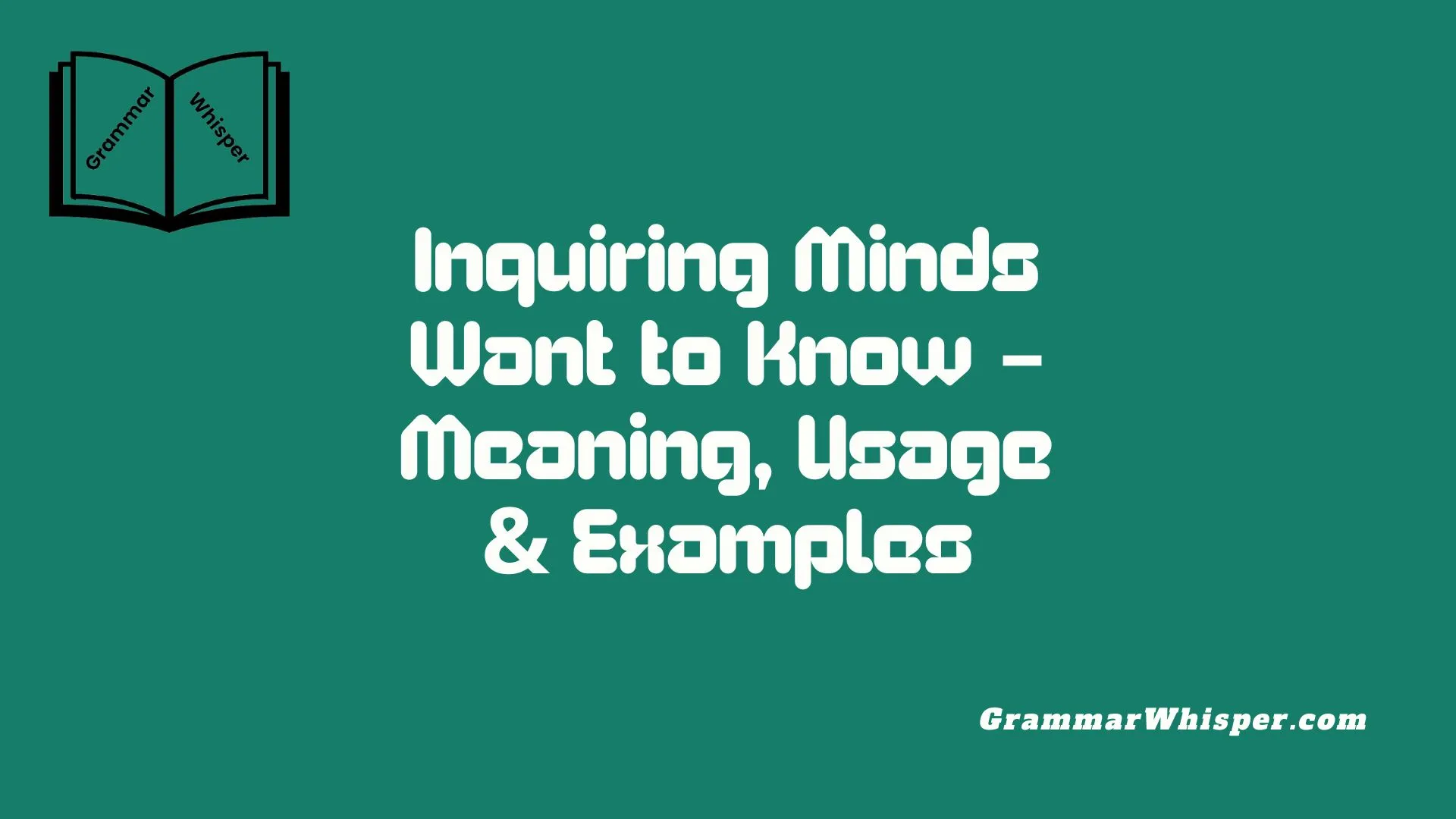The phrase Inquiring Minds Want to Know is a famous expression full of curiosity and the urge to seek answers and explore the unknown. It holds a vital place in education and culture, acting as a driving force for discovery, learning, and innovation. This article dives deep into the meaning and origin of the phrase, providing practical usage and rich examples. For every student, educator, or writer, understanding this phrase fuels the inquisitive spirit and adds valuable knowledge to your mind.
From my experience, this phrase truly fuels your passion for learning. The inquiry it inspires encourages you to find insights that might otherwise remain hidden. It pushes everyone, from the curious soul to the dedicated learner, to keep asking questions and to use this knowledge in many applications. This phrase also serves as a reminder that the drive to learn and discover lies at the heart of human growth and progress.
What Does “Inquiring Minds Want to Know” Actually Mean?
At its core, “inquiring minds want to know” is a playful, catchy way of saying that curious people seek information. It highlights a natural human trait: when something sparks our interest, we feel compelled to ask questions and learn more.
The phrase often appears in contexts where people show active curiosity or demand answers about a topic. It’s like saying, “We’re curious, and we want the truth.”
Think of it as a call to investigation or an invitation to dive deeper. Whether it’s gossip, science, politics, or personal stories, an “inquiring mind” drives the process of discovery.
Key Points:
- Expresses natural curiosity and desire for knowledge
- Often used humorously or seriously to invite questions
- Signals an active, questioning mindset
Tracing the Origins: Where Did the Phrase Come From?
The phrase “inquiring minds want to know” emerged in the 1960s, largely popularized by American television and tabloid journalism. It became a staple in gossip columns and entertainment news, where reporters and audiences alike demanded juicy details.
Early Uses and Media Influence
- 1960s TV and tabloids: The phrase gained traction in shows and magazines focusing on celebrity news. It acted as a teaser to hook viewers or readers.
- Journalistic catchphrase: Editors used it to imply that the public craves inside information and secrets.
- Advertising and slogans: The phrase’s rhythm and alliteration made it easy to remember and repeat.
Though the exact first use is hard to pinpoint, it quickly became embedded in popular culture as a lighthearted way to acknowledge curiosity.
How Dictionaries Define the Phrase
Authoritative dictionaries capture the essence of “inquiring minds want to know” as a phrase emphasizing active curiosity. Here are some dictionary insights:
| Source | Definition |
| Cambridge English Dictionary | A phrase used to say that people are eager to find out about something, often in a lighthearted way. |
| Merriam-Webster | An informal phrase used to indicate curiosity or interest in information or details. |
| Oxford English Dictionary | Not a formal idiom, but recognized as a colloquial expression meaning “people want to know.” |
Inquiry is more than just asking questions. It’s a powerful learning tool that turns curiosity into understanding. When minds inquire, they connect dots, challenge assumptions, and build knowledge.
Why Inquiry Matters:
- Drives exploration: Curiosity makes us dig deeper, uncovering new facts and ideas.
- Encourages critical thinking: Inquiry demands analysis and judgment rather than accepting information blindly.
- Fuels innovation: Many breakthroughs come from asking the right questions.
- Builds lifelong learning habits: People who inquire tend to keep learning throughout their lives.
Consider the famous words of Albert Einstein:
“The important thing is not to stop questioning. Curiosity has its reason for existing.”
The Inquiry Process Explained
Inquiry follows a logical flow that transforms vague curiosity into clear knowledge. Here’s how the process typically works:
| Step | Description |
| Ask a Question | Start with a specific, interesting question or problem. |
| Gather Information | Collect relevant data, facts, and opinions through research or observation. |
| Analyze | Evaluate the information critically, looking for patterns and connections. |
| Draw Conclusions | Formulate an answer or explanation based on evidence. |
| Reflect & Share | Consider what was learned and communicate findings. |
This structure applies to many fields – science, education, business, and even daily decision-making.
John Dewey and the Rise of Inquiry-Based Learning
John Dewey, an influential philosopher and educator in the early 20th century, championed inquiry as the heart of meaningful education. He believed students learn best by engaging actively with questions and problems instead of passively receiving facts.
Dewey’s Contributions:
- Learning by doing: Dewey argued that experience combined with reflection deepens understanding.
- Student-centered education: Inquiry encourages learners to pursue their interests and challenges.
- Critical thinking focus: Education should foster skills to question and reason independently.
Dewey’s ideas laid the groundwork for modern inquiry-based learning (IBL), which emphasizes exploration, experimentation, and student autonomy.
Inquiry in the 21st-Century Learning Standards
Today’s education systems recognize inquiry as a key skill for the modern world. Inquiry-based learning aligns with the demands of the 21st-century learner, who needs to navigate complex information and collaborate effectively.
How Inquiry Fits in Modern Education:
- Critical thinking and problem-solving: Students analyze information and solve real-world issues.
- Collaboration: Inquiry often involves teamwork and sharing diverse perspectives.
- Digital literacy: Using online tools and resources effectively to research questions.
- Creativity and innovation: Inquiry encourages thinking outside the box.
Many standards, such as the Common Core State Standards and Next Generation Science Standards (NGSS), explicitly highlight inquiry skills.
Academic and Professional Settings: When “Inquiring Minds Want to Know” Applies
The phrase isn’t just casual banter. It reflects an important mindset in serious academic and professional environments where curiosity drives progress.
Academic Use:
- Researchers design studies based on pressing questions.
- Teachers encourage students to ask and answer their questions.
- Critical inquiry forms the basis of essays, theses, and presentations.
Professional Use:
- Problem-solving teams inquire to identify the root causes of issues.
- Market research depends on asking the right questions about consumers.
- Innovation labs thrive on inquisitive minds seeking new solutions.
“Inquiring Minds Want to Know” in Popular Culture and Media
This phrase pops up in TV shows, films, and journalism to highlight curiosity or tease secrets.
Examples:
- Talk shows: Hosts use it humorously to invite juicy celebrity gossip.
- News headlines Sometimes feature the phrase to draw readers into investigative stories.
- Social media: Memes and posts play with the phrase to spark discussions.
Its catchy rhythm makes it memorable and easy to repurpose, contributing to its longevity.
Practical Tips for Cultivating Your Inquiring Mind
Want to boost your curiosity and think more like an “inquiring mind”? Here are some tips to get you started:
- Ask open-ended questions: Instead of “yes/no” queries, try “how” and “why.”
- Stay skeptical: Don’t accept everything at face value; verify facts.
- Read widely: Exposure to different fields and opinions sparks new questions.
- Engage in discussions: Sharing ideas often leads to fresh insights.
- Reflect regularly: Take time to consider what you’ve learned and what remains unclear.
Conclusion
The phrase “inquiring minds want to know” captures a timeless truth – curiosity fuels growth, learning, and discovery. Whether in education, work, or everyday life, nurturing an inquisitive spirit leads to deeper understanding and richer experiences.
So next time you feel the urge to ask, explore, or investigate, remember: your inquiring mind is your greatest asset. Keep it alive, and the world will always have answers waiting for you.
FAQs
What does the phrase “inquiring minds want to know” really mean?
It means curious people want to learn more and seek answers. The phrase highlights the natural human desire to ask questions and explore unknown topics.
Where did the phrase “inquiring minds want to know” originate?
The phrase became popular in the 1960s, especially through American TV shows and tabloids. It was often used to tease viewers or readers eager for inside information or gossip.
How is inquiry important in education?
Inquiry encourages active learning by having students ask questions, research, analyze, and draw conclusions. This method builds critical thinking, problem-solving, and lifelong learning skills.
Can inquiry skills help outside of school?
Absolutely. Inquiry is vital in the workplace, science, daily decision-making, and even personal growth. Curious minds tend to solve problems better and innovate more effectively.
Are there practical ways to develop an “inquiring mind”?
Yes! You can practice by asking open-ended questions, staying skeptical, reading broadly, engaging in conversations, and reflecting on what you learn regularly.











